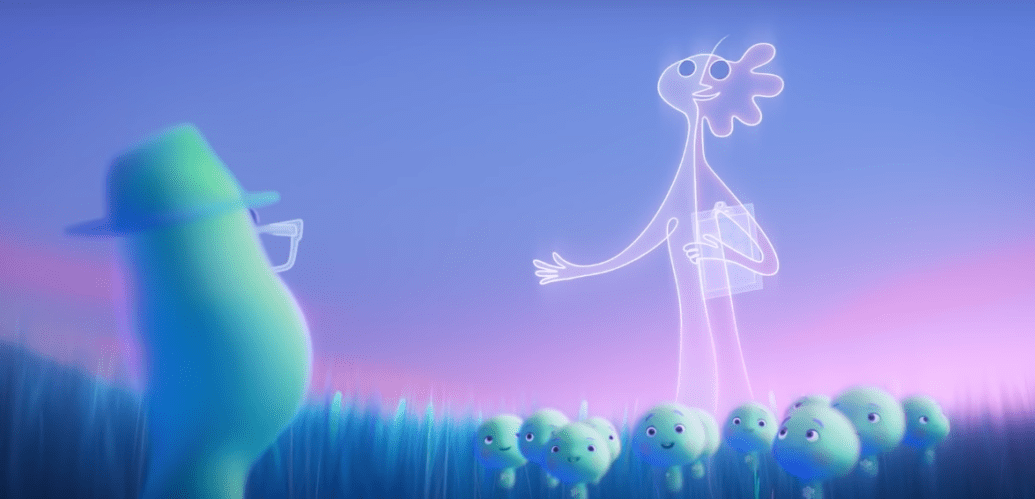The latest animated film I watched was Soul from Pixar. With its cast of quirky, funny characters, it gently guides viewers into a deep, thoughtful exploration—all while keeping things relaxed.
The Terms of Giving and Receiving
The story follows Joe, a music teacher passionate about jazz, dreaming of his big break on stage. That chance finally arrives when he’s invited to perform with a renowned jazz artist. But, in a twist of fate, an accident forces him to postpone the gig.
Why call it fortunate? As the Dalai Lama once said, “Sometimes not getting what you want is a wonderful stroke of luck.”
The plot shifts when Joe tumbles down a manhole. Mistakenly assigned as a mentor to souls preparing for Earth, he’s tasked with helping a stubborn little soul, Number 22, find her spark.
Number 22 is a tough case, having stumped countless great figures who tried to guide her. Their grandeur doesn’t impress her; in fact, she dreads the idea of living in a confined, limited body—where even a passion feels like a cage.
To get back to Earth, Joe must help 22 discover something worth living for. Their journey paints Joe as fiercely driven, while 22 seems like a useless, irritating soul.
After tireless effort, Joe makes it to his performance. His talent shines, earning applause. But when the clapping fades, the stage lights dim, and the crowd—friends and family included—disperses, he’s left alone.
At what he thought was his peak, Joe realizes a truth: the thrill of living his dream onstage isn’t all that different from the day the principal told him he’d landed a full-time teaching job—complete with salary, benefits, and a pension.
He’d assumed ditching the mundane would lead to joy through doing what he loved. Yet both paths end at the same crowded subway, where people glue their eyes to phones and snap at each other after a long day.
Joe sees it’s not just about having or lacking a passion—living authentically matters more. He understands why those great mentors failed with 22: they expected her to mirror them. They pushed her to be something grand, forgetting not everyone wants to trade their one shot at life for fame.
In their greatness, they stripped away the ordinariness of those who don’t crave greatness. To me, forcing a gift on someone is like strong-arming them into a high-interest loan. Here, it’s not money but expectations lent out, with the demand for repayment in kind.
So, what life does 22 choose?
The Greatness in Smallness
Fail to shape an angel, and you might accidentally forge a demon. That’s 22’s story. After endless judgmental criticism, she spirals downward. The worst part? Feeling like she’s the problem. She becomes a lost soul adrift in a vast desert.
At that moment, Joe grasps that 22’s choice to “choose nothing” reflects humanity’s essence at birth. If she were truly useless, she wouldn’t have earned a human life—she’d be some lesser being.
Unburdened by her own passions, 22 can embrace others’ dreams. In her open, unjudging state, she lifts up a barber, Joe himself, and a student from his class. Encouraging someone to be their best self outweighs molding them into what we want.
By welcoming the small and imperfect, 22 helps those around her find peace with themselves and value life. Her existence is a laser focus on the present, not lofty ambitions.
A soul that cherishes the little things can nurture seeds into mighty trees—and knows a simple truth: no tree grows tall overnight.
In Place of a Conclusion
I’ve found that really watching an animated film can rekindle lessons we’ve let slip away.
As kids, most of us saw the world through clear, hopeful eyes, spotting the good in it. Growing up, we craft our own lenses. They shield us from strain, dust, and hurt, but at a cost: everything takes on a bleak, dark tint.
Life and death carry meanings that only those who’ve lived and died can fully grasp. Still, even the dullest life holds purpose—like serving as a reference for others.
Every being is nature’s experiment. With our advanced brains and burning ambitions, we humans sometimes think we’re something grander. That might hold in our minds, but reality? Less so. If we were truly complete, why do our lives have a start and an end?
So, if we chase immortality by fusing ourselves with machines, are we perfecting anything? Maybe, instead, we’re drifting further from it.
To me, perfection might just be embracing the imperfection in ourselves and everything else.
If you’ve got the time, give Soul a watch. I know most of us don’t love sinking hours into thinking—we’d rather gobble up pre-digested wisdom from books or the web. But trust me, stumbling onto a few ideas of your own in this life is worth it.















